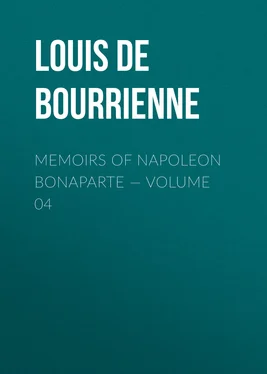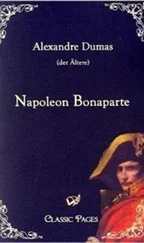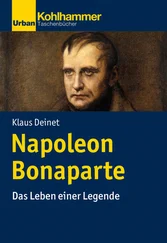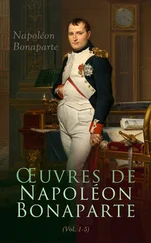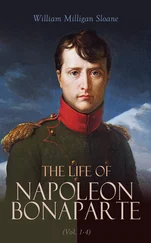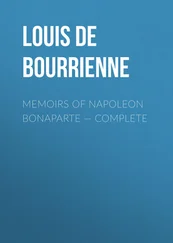Louis Bourrienne - Memoirs of Napoleon Bonaparte — Volume 04
Здесь есть возможность читать онлайн «Louis Bourrienne - Memoirs of Napoleon Bonaparte — Volume 04» — ознакомительный отрывок электронной книги совершенно бесплатно, а после прочтения отрывка купить полную версию. В некоторых случаях можно слушать аудио, скачать через торрент в формате fb2 и присутствует краткое содержание. Жанр: Биографии и Мемуары, История, foreign_edu, foreign_antique, foreign_prose, на английском языке. Описание произведения, (предисловие) а так же отзывы посетителей доступны на портале библиотеки ЛибКат.
- Название:Memoirs of Napoleon Bonaparte — Volume 04
- Автор:
- Жанр:
- Год:неизвестен
- ISBN:нет данных
- Рейтинг книги:3 / 5. Голосов: 1
-
Избранное:Добавить в избранное
- Отзывы:
-
Ваша оценка:
- 60
- 1
- 2
- 3
- 4
- 5
Memoirs of Napoleon Bonaparte — Volume 04: краткое содержание, описание и аннотация
Предлагаем к чтению аннотацию, описание, краткое содержание или предисловие (зависит от того, что написал сам автор книги «Memoirs of Napoleon Bonaparte — Volume 04»). Если вы не нашли необходимую информацию о книге — напишите в комментариях, мы постараемся отыскать её.
Memoirs of Napoleon Bonaparte — Volume 04 — читать онлайн ознакомительный отрывок
Ниже представлен текст книги, разбитый по страницам. Система сохранения места последней прочитанной страницы, позволяет с удобством читать онлайн бесплатно книгу «Memoirs of Napoleon Bonaparte — Volume 04», без необходимости каждый раз заново искать на чём Вы остановились. Поставьте закладку, и сможете в любой момент перейти на страницу, на которой закончили чтение.
Интервал:
Закладка:
He would then vent his ill-humour on the right arm of his chair, mutilating it with his penknife, which he seemed to keep for no other purpose. I always took care to keep good pens ready for him; for, as it was my business to decipher his writing, I had a strong interest in doing what I could to make it legible.
The sound of bells always produced in Bonaparte pleasurable sensations, which I could never account for. When we were at Malmaison, and walking in the alley leading to the plain of Ruel, how many times has the bell of the village church interrupted our most serious conversations!
He would stop, lest the noise of our footsteps should drown any portion of the delightful sound. He was almost angry with me because I did not experience the impressions he did. So powerful was the effect produced upon him by the sound of these bells that his voice would falter as he said, "Ah! that reminds me of the first years I spent at Brienne! I was then happy!" When the bells ceased he would resume the course of his speculations, carry himself into futurity, place a crown on his head, and dethrone kings.
Nowhere, except on the field of battle, did I ever see Bonaparte more happy than in the gardens of Malmaison. At the commencement of the Consulate we used to go there every Saturday evening, and stay the whole of Sunday, and sometimes Monday. Bonaparte used to spend a considerable part of his time in walking and superintending the improvements which he had ordered. At first he used to make excursions about the neighbourhood, but the reports of the police disturbed his natural confidence, and gave him reason to fear the attempts of concealed royalist partisans.
During the first four or five days that Bonaparte spent at Malmaison he amused himself after breakfast with calculating the revenue of that domain. According to his estimates it amounted to 8000 francs. "That is not bad!" said he; "but to live here would require an income of 30,000 livres!" I could not help smiling to see him seriously engaged in such a calculation.
Bonaparte had no faith in medicine. He spoke of it as an art entirely conjectural, and his opinion on this subject was fired and incontrovertible. His vigorous mind rejected all but demonstrative proofs.
He had little memory for proper names, words, or dates, but he had a wonderful recollection of facts and places. I recollect that, on going from Paris to Toulon, he pointed out to me ten places calculated for great battles, and he never forgot them. They were memoranda of his first youthful journeys.
Bonaparte was insensible to the charms of poetic harmony. He had not even sufficient ear to feel the rhythm of poetry, and he never could recite a verse without violating the metre; yet the grand ideas of poetry charmed him. He absolutely worshipped Corneille; and, one day, after having witnessed a performance of 'Cinna', he said to me, "If a man like Corneille were living in my time I would make him my Prime Minister. It is not his poetry that I most admire; it is his powerful understanding, his vast knowledge of the human heart, and his profound policy!" At St. Helena he said that he would have made Corneille a prince; but at the time he spoke to me of Corneille he had no thought of making either princes or kings.
Gallantry to women was by no means a trait in Bonaparte's character. He seldom said anything agreeable to females, and he frequently addressed to them the rudest and most extraordinary remarks. To one he would say, "Heavens, how red your elbows are!" To another, "What an ugly headdress you have got!" At another time he would say, "Your dress is none of the cleanest….. Do you ever change your gown? I have seen you in that twenty times!" He showed no mercy to any who displeased him on these points. He often gave Josephine directions about her toilet, and the exquisite taste for which she was distinguished might have helped to make him fastidious about the costume of other ladies. At first he looked to elegance above all things: at a later period he admired luxury and splendour, but he always required modesty. He frequently expressed his disapproval of the low-necked dresses which were so much in fashion at the beginning of the Consulate.
Bonaparte did not love cards, and this was very fortunate for those who were invited to his parties; for when he was seated at a card-table, as he sometimes thought himself obliged to be, nothing could exceed the dulness of the drawing-room either at the Luxembourg or the Tuileries. When, on the contrary, he walked about among the company, all were pleased, for he usually spoke to everybody, though he preferred the conversation of men of science, especially those who had been with him in in Egypt; as for example, Monge and Berthollet. He also liked to talk with Chaptal and Lacépède, and with Lemercier, the author of 'Agamemnon'.
Bonaparte was seen to less advantage in a drawing-room than at the head of his troops. His military uniform became him much better than the handsomest dress of any other kind. His first trials of dress-coats were unfortunate. I have been informed that the first time he wore one he kept on his black cravat. This incongruity was remarked to him, and he replied, "So much the better; it leaves me something of a military air, and there is no harm in that." For my own part, I neither saw the black cravat nor heard this reply.
The First Consul paid his own private bills very punctually; but he was always tardy in settling the accounts of the contractors who bargained with Ministers for supplies for the public service. He put off these payments by all sorts of excuses and shufflings. Hence arose immense arrears in the expenditure, and the necessity of appointing a committee of liquidation. In his opinion the terms contractor and rogue were synonymous. All that he avoided paying them he regarded as a just restitution to himself; and all the sums which were struck off from their accounts he regarded as so much deducted from a theft. The less a Minister paid out of his budget the more Bonaparte was pleased with him; and this ruinous system of economy can alone explain the credit which Decrès so long enjoyed at the expense of the French navy.
On the subject of religion Bonaparte's ideas were very vague. "My reason," said he, "makes me incredulous respecting many things; but the impressions of my childhood and early youth throw me into uncertainty." He was very fond of talking of religion. In Italy, in Egypt, and on board the 'Orient' and the 'Muiron', I have known him to take part in very animated conversations on this subject.
He readily yielded up all that was proved against religion as the work of men and time: but he would not hear of materialism. I recollect that one fine night, when he was on deck with some persons who were arguing in favour of materialism, Bonaparte raised his hand to heaven and, pointing to the stars, said, "You may talk as long as you please, gentlemen, but who made all that?" The perpetuity of a name in the memory of man was to him the immortality of the soul. He was perfectly tolerant towards every variety of religious faith.
Among Bonaparte's singular habits was that of seating himself on any table which happened to be of a suitable height for him. He would often sit on mine, resting his left arm on my right shoulder, and swinging his left leg, which did not reach the ground; and while he dictated to me he would jolt the table so that I could scarcely write.
Bonaparte had a great dislike to reconsider any decision, even when it was acknowledged to be unjust. In little as well as in great things he evinced his repugnance to retrograde. An instance of this occurred in the affair of General Latour-Foissac. The First Consul felt how much he had wronged that general; but he wished some time to elapse before he repaired his error. His heart and his conduct were at variance; but his feelings were overcome by what he conceived to be political necessity. Bonaparte was never known to say, "I have done wrong:" his usual observation was, "I begin to think there is something wrong."
Читать дальшеИнтервал:
Закладка:
Похожие книги на «Memoirs of Napoleon Bonaparte — Volume 04»
Представляем Вашему вниманию похожие книги на «Memoirs of Napoleon Bonaparte — Volume 04» списком для выбора. Мы отобрали схожую по названию и смыслу литературу в надежде предоставить читателям больше вариантов отыскать новые, интересные, ещё непрочитанные произведения.
Обсуждение, отзывы о книге «Memoirs of Napoleon Bonaparte — Volume 04» и просто собственные мнения читателей. Оставьте ваши комментарии, напишите, что Вы думаете о произведении, его смысле или главных героях. Укажите что конкретно понравилось, а что нет, и почему Вы так считаете.
